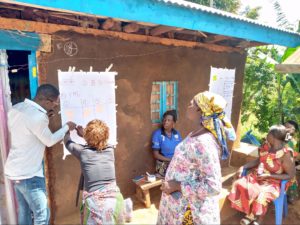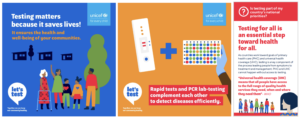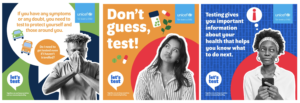PARTNERS:
UNICEF Global
LOCATION:
Global implementation, with research and testing samples conducted in Cambodia, DRC, Mozambique, Rwanda, Uganda
WEBSITE:
lets-test.org
PARTNERS:
UNICEF Global
LOCATION:
Global implementation, with research and testing samples conducted in Cambodia, DRC, Mozambique, Rwanda, Uganda
WEBSITE:
lets-test.org
81% of people in LMICs have little to no access to diagnostics, other than HIV and malaria. (Lancet, 2021)
Access to, demand for, and use of testing for public health priorities is inadequate, especially in low and middle-income countries (LMICs). Out of nearly 5.7 billion COVID-19 tests conducted worldwide, only 20% were in LMICs, even though these countries are home to half of the global population. Insufficient testing for diseases is a significant concern as it hampers disease elimination, health system strengthening, and antimicrobial resistance (AMR) efforts.
UNICEF partnered with 17 Triggers to address the lack of diagnostic access in LMICs by equipping advocacy champions with evidence-based tools to persuade national health policy makers to improve diagnostic access and usage for COVID-19.
As the project evolved, it became clear that there was a widespread lack of testing for various diseases. This led to the expansion of the project’s scope to include advocacy and demand generation throughout the entire health system, not just limited to COVID-19.
Qualitative research was conducted in five countries in 2022 to inform development of the Testing Advocacy Strategy and Toolkit. This research included interviews with global experts and discussions with respondents from Uganda, Rwanda, Cambodia, Mozambique, and the Democratic Republic of Congo. In total, 22 global experts, 65 policymakers and CSO representatives, and 345 community members were interviewed. Development of toolkit prototype materials comprised workshops with global Advocacy Champions and digital A/B testing, which informed toolkit access, format, visual style, and communication assets.

Formative research being undertaken in DRC
The resulting Toolkit is designed for use by diagnostic advocacy champions and comprises of ready to use assets to target policymakers on the supply side, as well as community members on the demand side. It is structured around a set of factors that may influence use of testing in LMICs, allowing users to quickly identify the factors most relevant to their context.
The Toolkit provides step-by-step guides and assets to support impactful and productive engagement with policymakers, encouraging them to advocate for increased supply of quality diagnostics. The policymaker assets are designed to support face-to-face conversations, digital interactions, and longer, technical discussions with policymakers and other stakeholders involved in testing access policy and program decisions.
 An example of the digital assets developed for policymaker advocacy
An example of the digital assets developed for policymaker advocacy
Community-level advocacy for increased demand for testing is supported by toolkit communications assets, facilitation tools and activities, memorable info-bites and content for social media campaigns. These assets promote the benefits of testing and debunk common myths that hinder informed demand for testing.

An example of the digital assets developed for community advocacy
A unique aspect of the Toolkit is that the assets have been delivered to users as easily editable files, allowing Advocacy Champions to update the language and imagery used in the tools to fit their local audience. The included guides help Toolkit users adapt the assets to address testing challenges in their specific context, regardless of their prior experience in advocacy and SBCC.
The ‘Let’s Test’ Toolkit was launched during the 2023 World Health Assembly (WHA) and is now being downloaded to adaptation and application by diagnostics advocates and CSOs globally. If you would like to see the Toolkit and assets, please go to: lets-test.org